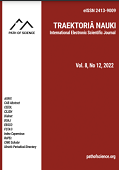Implementation of Electronic Transactions of Notary's Deeds in Improving Legal Certainty and Data Security
Implementation of Electronic Transactions of Notary's Deeds in Improving Legal Certainty and Data Security
Author(s): Tatik Susilawati, Zainal Asikin, Lalu Wira Pria SuhartanaSubject(s): Law, Constitution, Jurisprudence, ICT Information and Communications Technologies, Sociology of Law
Published by: Altezoro, s. r. o. & Dialog
Keywords: Implementation; Electronic Transactions; Notary;
Summary/Abstract: This research aims to determine the regulation of electronic transactions in Notarial deeds (Notary Study in West Lombok). This type of research combines normative legal elements, which are then supported by adding data or empirical elements. Notaries, Temporary Notary Officials, Substitute Notaries, and MPDs carry out electronic notarial deed arrangements, and after 25 years, the Notary must submit their protocol to the MPD. The UUJN/UUJN-P does not regulate whether notary protocol storage is limited to paper media (conventional) or allows for digital storage using electronic media by a notary. This is because the Notary's protocol is considered a state archive, and the Archives Law governs the permissibility of storing archives using electronic media. Implementing notarial deeds via electronic means to increase legal certainty and data security, namely by storing Notarial protocols digitally using electronic media not regulated in UUJN/UUJNP, legal responsibilities arising from violations or unlawful acts apply to legal provisions. In general, whether civil, criminal, or administrative, to the Notary concerned. Another responsibility of the Notary who holds the protocol is to keep the parties' data confidential in connection with legal acts outlined in the form of an authentic deed.
Journal: Traektoriâ Nauki
- Issue Year: 10/2024
- Issue No: 1
- Page Range: 8024-8033
- Page Count: 10
- Language: English

